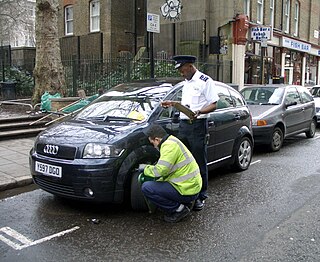
The Driver and Vehicle Licensing Agency is the organisation of the UK government responsible for maintaining a database of drivers in Great Britain and a database of vehicles for the entire United Kingdom. Its counterpart for drivers in Northern Ireland is the Driver and Vehicle Agency (DVA). The agency issues driving licences, organises collection of vehicle excise duty and sells personalised registrations.

Sir Gregory Knight is a British politician, author and musician. He has served as the Conservative MP for East Yorkshire since 2001, having previously served as the MP for Derby North from 1983 to 1997. He served as a minister in the governments of Margaret Thatcher, John Major and David Cameron.
Vehicle Excise Duty is an annual tax levied as an excise duty, and which must be paid for most types of powered vehicles which are to be used or parked on public roads in the United Kingdom. Registered vehicles that are not being used or parked on public roads and which have been taxed since 31 January 1998 must be covered by a Statutory Off Road Notification (SORN) to avoid VED. In 2016, VED generated approximately £6 billion for the Exchequer.

A wheel clamp, also known as wheel boot, parking boot, or Denver boot, is a device that is designed to prevent motor vehicles from being moved. In its most common form, it consists of a clamp that surrounds a vehicle wheel, designed to prevent removal of both itself and the wheel.

A parking enforcement officer (PEO), traffic warden, parking inspector/parking officer, or civil enforcement officer is a member of a traffic control agency, local government, or police force who issues tickets for parking violations. The term parking attendant is sometimes considered a synonym but sometimes used to refer to the different profession of parking lot attendant.
A vanity plate or personalized plate ; prestige plate, private number plate, cherished plate or personalised registration ; personalised plate or custom plate is a special type of vehicle registration plate on an automobile or other vehicle. The owner of the vehicle pays extra money to have their own choice of numbers or letters, usually portraying a recognizable phrase, slogan, or abbreviation, on their plate. Sales of vanity plates are often a significant source of revenue for North American provincial and state licensing agencies. In some jurisdictions, such as British Columbia, vanity plates have a different color scheme and design.

A pay and display machine is a type of ticket machine used for regulating parking in urban areas or in car parks. It relies on a customer purchasing a ticket from a machine and displaying the ticket on the dashboard, windscreen or passenger window of the vehicle. Details included on a printed ticket are generally the location and operator of the machine, expiry time, fee paid and time entered.
A civil penalty or civil fine is a financial penalty imposed by a government agency as restitution for wrongdoing. The wrongdoing is typically defined by a codification of legislation, regulations, and decrees. The civil fine is not considered to be a criminal punishment, because it is primarily sought in order to compensate the state for harm done to it, rather than to punish the wrongful conduct. As such, a civil penalty, in itself, will not carry jail time or other legal penalties. For example, if a person were to dump toxic waste in a state park, the state would have the same right to seek to recover the cost of cleaning up the mess as would a private landowner, and to bring the complaint to a court of law, if necessary.
The Vehicle Identity Check (VIC) was a regulation concerning car ownership that was in force in the UK between 2003 and 2015.

Decriminalised parking enforcement (DPE) is the name given in the United Kingdom to the civil enforcement of car parking regulations, carried out by civil enforcement officers, operating on behalf of a local authority. The Road Traffic Act 1991 (c. 40) provided for the decriminalisation of parking-related contraventions committed within controlled parking zones (CPZ) administered by local councils across the UK. The CPZs under the control of the local councils are also referred to as yellow routes and they can be easily identified with yellow lines marked on the roads with relevant time plates. Councils employ parking attendants to enforce their CPZs directly.
The Retail Motor Industry Federation (RMI) represents the interests of motor industry operators in England, Wales, Northern Ireland and the Isle of Man providing sales and services to motorists and businesses. It does not represent businesses in Scotland, which are represented by the independent Scottish Motor Trade Association.

Park and ride bus services in the United Kingdom are bus services designed to provide intermodal passenger journeys between a private mode of transport and a shared mode bus. The common model of bus based park and ride model is transfer from a private car to a public transport bus, although schemes may also be used by pedestrians and cyclists. "Park and ride" commonly refers to permanent schemes operated as part of the public transport system, for onward transport from a permanent car park to an urban centre. ‘Park and ride bus’ can also be used to describe temporary and seasonal schemes, services operated for private or specialised users, and services that do not necessarily serve an urban centre. Bus services can be permanent, seasonal, or only operate on specific days of the week, or for specific events.

Pay-by-phone parking is a system of paying for car parking via a mobile app or mobile network operator. It is an alternative to the traditional ways to pay for parking of parking meter or pay and display machines. SMS pay-by-phone parking was first introduced by Vipnet. Since its introduction in Croatian capital Zagreb in 2001 under the name M-parking, the number of registered users has steadily increased. By 2004, the Croatian M-parking scheme was the largest in Europe. Today, pay-by-phone parking is used by millions of people all around the world.

The Protection of Freedoms Act 2012 is an Act of the Parliament of the United Kingdom. As the Protection of Freedoms Bill, it was introduced in February 2011, by the Home Secretary, Theresa May. The bill was sponsored by the Home Office. On Tuesday, 1 May 2012, the Protection of Freedoms Bill completed its passage through Parliament and received royal assent.

Vine v London Borough of Waltham Forest was a case heard at the Court of Appeal of England and Wales in 2000 and set new case law with regard to the use of wheel clamps by establishing a legal precedent in relation to the concept of consent by expanding upon the decision in the case of Arthur & Another v Anker & Another [1996] 3 AER 783.

Arthur & Another v Anker & Another is an English legal case that set new case law in respect of the use of wheel clamps to immobilise vehicles on private land and is regarded as the leading legal authority on the subject. The case established a legal precedent in relation to the use of wheel clamps and the concept of consent but some years later this was expanded upon in the case of Vine v London Borough of Waltham Forest.
Vehicle registration plates are the alphanumeric plates used to display the registration mark of a vehicle, and have existed in the United Kingdom since 1904. It is compulsory for motor vehicles used on public roads to display vehicle registration plates, with the exception of vehicles of the reigning monarch used on official business.
Total Car Parks, established in 2008, is a British company with its head office in Colchester, UK. A member of the British Parking Association, the company operates car parks in various regions, in particular Manchester, using an online pre-payment model. Its aim, according to its head office, is to provide parking services to the average motorist at affordable prices.

The Driver and Vehicle Standards Agency (DVSA) is an executive agency of the UK Department for Transport (DfT).

YourParkingSpace is an online marketplace and parking reservation service for drivers looking to find and pre-book parking in the United Kingdom. The website and mobile app feature over 350,000 privately owned and commercially operated parking spaces, which are available to book by the hour, day or month on a subscription basis. As of 2018, YourParkingSpace served over 50 cities across the country. The company is headquartered in Stratford, London.











